By contrast, putting order out to international tender could cost shipbuilding jobs and prosperity, warns union.
GMB, the shipbuilding union, has revealed that the Ministry of Defence would not be liable to pay any compensation if Ministers changed their policy and kept a £1 billion order for up to three new military support ships in the UK.
GMB say that their research shows if the much-needed new Fleet Solid Support ships were built in British shipyards around 6,700 jobs would be created, and £285 million pumped back to the exchequer through income tax, national insurance contributions and lower welfare payments.
A new written answer from the Defence Procurement Minister, Guto Bebb, has revealed there is no threat of any compensation payments to non-UK companies if Ministers changed their policy.
The House of Commons is today set to debate a Labour motion which ‘calls on the Government to make the competition for the Fleet Solid Support ships contract a UK-only competition to maximise the return on that contract.’
Ross Murdoch, GMB National Officer, said:
“This written statement proves what GMB has been saying for some time – there is no reason for the Government to punt this lucrative contract overseas.
Keeping this contract in the UK would cost Ministers nothing – but putting it out to international tender could impose a severe cost on shipbuilding workers and their communities – particularly as we are already witnessing significant job losses at UK shipyards as the Carrier programme runs down.
GMB’s campaign is for this £1billion contact to stay in the UK, creating jobs and wealth for our county, including in the steel industry. Parliament should back and respect Labour’s motion today to keep this crucial order in the UK.”
Recently, the First Minister of Scotland stated that the international tendering for auxiliary vessel contracts is a betrayal for the Clyde, despite the yards having no interest in them, having never been promised them and the fact the vessels couldn’t physically fit on the slipway.
Speaking during First Minister’s Questions, she said:
“That work should be on the Clyde, I argue that that work was promised to the Clyde and should definitely go to the Clyde. We should be very clear. What we are now seeing develop around that work and the future of the shipyards is nothing short of a blatant betrayal of Scottish shipyards. During the referendum, promises were made to those shipyards by the Tories, and indeed, by all the unionist parties—the shipyards were told of promises of work for years to come.
The unionist parties specifically said that, if Scotland became independent, it would not be able to secure that work for the Clyde, because contracts could not go to “foreign countries. It is an absolute betrayal and I hope that we will hear all parties across the parliament stand up for shipbuilding on the Clyde.”
Sturgeon said the move was an “absolute betrayal” in light of promises made in the run-up to 2014’s independence vote. In fact, what was “promised” before the referendum was work on complex warships, like frigates and destroyers. There are three key problems with this:
- The Clyde is at capacity with the River class and Type 26 Frigate builds and has no intention of bidding for this work.
- The 40,000 tonne support vessels wouldn’t physically fit on the slip alongside the Type 26 Frigate builds.
- The only vessels “promised” were warships, such as frigates and destroyers.
Many, including some who work at the yards, have been surprised by these claims too:
having jut done a poll of those within ear shot of my desk, where we build complex warships on the clyde…not one person is outraged by ships we did not want, not being given to us. we are busy enough already thank you very much (this is my opinion and not that of my employer)
— Distant Smoke (@distant_smoke) April 20, 2018
They were never promised. The promise was for 13 type 26’s and a frigate factory. That promise has been broken (5 T26 replaced with 5 T31, and no frigate factory) if you want to complain that the Scottish have been betrayed, focus on those, not the MARS ships.
— Snowy (@PoliticalTeacup) April 20, 2018
When a friend of mine worked at BAE in Scotstoun he was tasked with carrying out the maths that showed that on launch HMS Diamond would not ram into @intuBraehead. On the day she stopped short by 6 inches. Current RFA Solid Support ships are 30m longer than Diamond. FYI.
— Ron Kane (@ka8895) April 19, 2018
We spoke to a contact at the yard who told us:
“This is the second time this news has popped up and I have no idea why the government in Edinburgh are making these claims, these vessels were not promised to us and they’re not warships. We’re busy with the last batch of River class ships and the first batch of the City class ships. If I had one message for them, it would be to stop using us a political football, we’re sick of it.”
Sorry, There was no “promise” on non-complex military ships (which can’t be made on the Upper Clyde anyway, no room). I can see why unions continue to be miffed but we’re confusing apples and oranges here.
— David Leask (@LeaskyHT) April 19, 2018
The MARS Solid Support Ships are not complex warships and as such, according to the National Shipbuilding Strategy, can be tendered overseas. According to the document, there are three tenets regarding UK shipbuilding policy that impact on the build location of contracts:
- For reasons of national security, all Royal Navy warships (destroyers, frigates and aircraft carriers) will continue to have a UK-owned design, and, will be built and integrated in the UK. Warship build will be via competition between UK shipyards. But international partners will be encouraged to work with UK shipyards and other providers to produce the best possible commercial solution.
- All other naval ships should be subject to open competition (provided that there are no compelling national security reasons to constrain a particular procurement to national providers). Integration of sensitive UK-specific systems will be done in the UK, where possible after competition between UK providers.
- Defence will take account of wider factors (including the impact on UK prosperity) when making these procurement decisions.
Even an SNP produced “Fact check” seems to conflate these auxiliary vessels with warships when discussing orders on the Clyde.
“Now, the order for the additional general purpose frigates could go elsewhere too. In fact, a new £1 billion order for three Royal Fleet Auxiliary ships is already going out to full international tender. This is despite UK government claims in 2012 that, “No British warship has been built in a foreign country for the last 50 years and we do not intend to start doing that now.”
Up to a point. No pointed out the RN has never built fighting ships in “foreign” yards. Yes said ‘Look at RN tankers built in Korea!’ No replied, ‘Those aren’t fighting ships’. Yes: ‘So you’re saying there’s a chance that work would come to the Clyde?’ No.
— alexmassie (@alexmassie) April 19, 2018
These are not warships, they were never promised to the Clyde and the Clyde can’t build them. What is happening however, where the real outrage should be, is that the unions are advocating that the build stay in the UK, not that it be done on the Clyde and this is something we agree with. There are strong arguments to build these ships in the UK.
Jude Brimble, GMB National Secretary, said:
“The Royal Fleet Auxiliary contracts are the key to unlocking the country’s massive shipbuilding potential. But Ministers refusal to put the UK’s interests first will mean that instead of a massive programme of shared economic and employment re-distribution, our firms will be competing against each other for slivers of complex warship work. It beggars belief that the Government wants to give this golden opportunity away to foreign competitors when working class communities up and down the country are crying out for decent work.”
Unions are demanding the vessels are built in the UK, as seeking an international tender “undermines the national interest” however none of them are advocating for the 40,000 tonne support vessels be built on the Clyde which is expected to be at capacity until into the 2030’s, long after the date the vessels will be required.
The Strategic Defence and Security Review 2015 confirmed that three new large Military Afloat Reach and Sustainability (MARS) Solid Support Ships would be acquired for the Royal Fleet Auxiliary, to replace the single-hulled RFA Fort Victoria, which entered service in 1994, and RFA Fort Rosalie and RFA Fort Austin (both dating from the late 1970s). The Solid Support Ship is designed to carry a wide range of stores to support other ships with ammunition, food and explosives to replenish naval ships at sea.
They will have extensive aviation facilities, with 2 flight decks, one at the stern and one spot on top of the hanger. They will have the ability to to replenish at sea via 6 replenishment stations, three on each side as well as using helicopters for vertical replenishment.
The Government’s procurement plans for the new support ships for the Royal Fleet Auxiliary are also facing opposition from Labour, the SNP and trade unions.
According to a briefing paper in the House of Commons library released today, the programme is currently in the Assessment Phase with the competition expected to be formally launched towards the end of 2018 and a contract signed in 2020. The MOD says the contract will be for two ships with an option for a third.
The briefing paper states:
“The Government intends to compete the contract internationally. Labour, the SNP and the shipbuilding trade unions argue the contract should be restricted to UK shipyards to support the shipbuilding industry, secure jobs and retain skills.
They argue the proposed ships are ‘warships’ and as such, the Government can use the Article 346 exemption to exclude the contract from EU procurement rules on national security grounds.
The Government disagrees, defining warships as ‘destroyers, frigates and aircraft carriers’, and says all other surface vessels should be subject to open competition.”
Two major unions, GMB and the Confederation of Shipbuilding and Engineering Unions (CSEU), have published reports outlining why they believe the ships should be classified as warships and why they should be competed domestically:
According to the briefing paper, the Unions’ arguments can be summarised as:
- The FSS should be seen as warships. They are armed and take part in counter-piracy and counter-narcotic missions;
- The Government’s commitment to revitalising domestic naval shipbuilding (as espoused in the National Shipbuilding Strategy) will only be achievable with a steady stream of orders;
- Building the FSS in the UK will help protect the UK shipbuilding industry, protect jobs and retain skills: GMB estimates up to 6,500 jobs could be created or secured, including 1,805 shipyard jobs;
- Rosyth shipyard will have a gap between the completion of HMS Prince of Wales (the second aircraft carrier) in 2019 and the expected refit of HMS Queen Elizabeth (the first aircraft carrier) in 2030, and FSS work could keep the shipyard operational in between these dates;
- The UK will financially benefit from returns to the Treasury in the form of taxes and national insurance contributions and lower welfare payments: GMB estimates £285m of the estimated £1bn contract could be returned to taxpayers this way; CSEU estimates 20% of the contract cost could be returned to the Treasury;
- The Government should factor in the revenue that could be returned to the Treasury when scoring bids between domestic suppliers and foreign competitors;
- There isn’t a level playing field as, the CSEU argues, “many foreign yards are either state owned, or receive significant direct or indirect subsidy… UK yards do not benefit in this way and are therefore at an unfair disadvantage.”
The TUC has also assessed the Article 346 exemption argument and argues the Government “has the sole right to determine” what its essential national security interests are. The TUC claims “other European nations have used the exemption to place orders for similar support ships with their own shipyards since the Directive was introduced”.
What is Article 346?
EU law requires most government contracts to be procured via an open, competitive process. The main EU legislation in the defence domain is the Defence and Security Directive 2009/81/EC, transposed into UK law by Defence and Security Public Contracts Regulations 2011.13
However, Article 346 of the Treaty on the Functioning of the European Union (TFEU) provides for an exemption to the procurement rules where a country considers it to be necessary for national security reasons: “any Member State may take such measures as it considers necessary for the protection of the essential interests of its security which are connected with the production of or trade in arms, munitions and war material”. Article 346 refers to a list drawn up in 1958 by the Council of Ministers of products to which the provisions
The briefing paper also states:
“While their primary purpose is to replenish Royal Navy vessels, the RFA also provides operational support including for counter-piracy and counter-terrorism missions. RFA vessels may embark Royal Marines and/or helicopters and work with allies (e.g. the US Navy in the Caribbean) on these operations. RFA Fort Victoria, for example, was involved in joint US/UK counter-narcotic operation in the Gulf which resulted in the seizure of £40m of heroin in March 2017, while a Sea King helicopter crew on RFA Fort Rosalie helped guide an Australian Frigate to a suspicious dhow carrying over £100m worth of drugs in the Indian Ocean earlier this year.”
December this year will see the formal issue of documentation inviting bids for the design and build contract and in 2020, the contract for design and build is to be awarded.


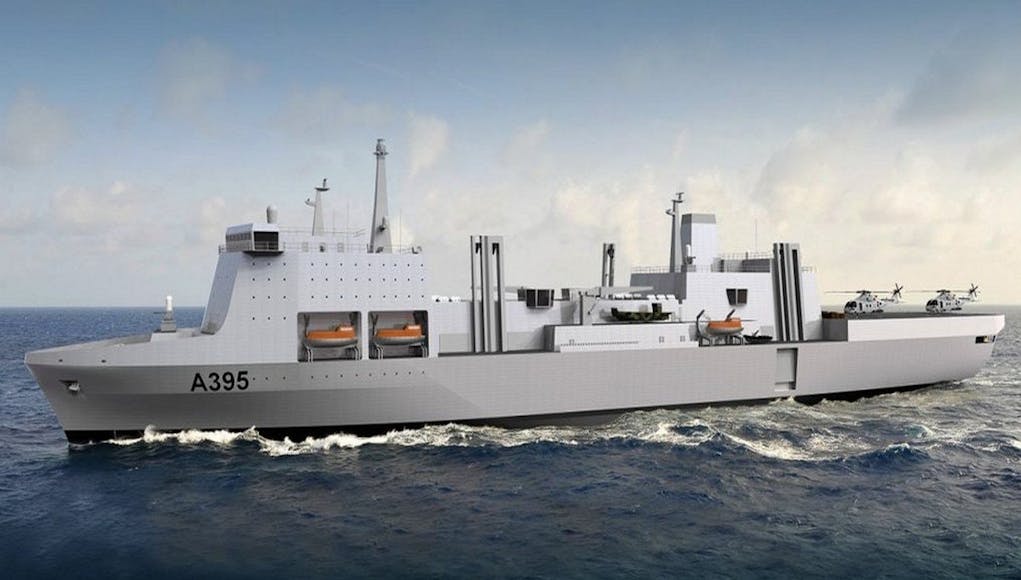

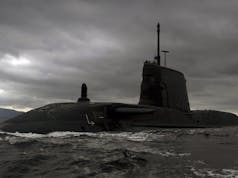
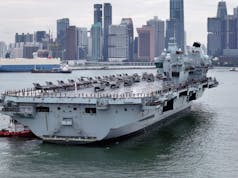
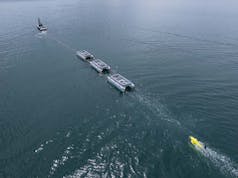
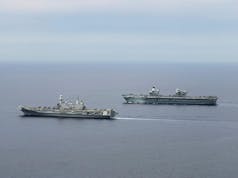






I wish the UKDJ would stop harping on about this repeatedly, its getting extremely boring, we get it ok?
How about a story about the uk’s new commitment to the north Atlantic?
Andy G. Seconded with feeling.
We’re all volunteers writing about topics we find interesting. You want a story, you write a story.
Surely, there should be no alternative than the UK? As pointed out above the country needs the work and the opportunities that such a programme would bring, in terms of creating an experience/skills base for the future. The argument that there aren’t enough yards which could handle a ship of this size, the answer is clear, build one and use it to go out and find new business; once the project is completed. We Brits need to change our mindsets and become proactive in certain lines of business, just like our friends in the Far East do.
I say this to the Government, stop messing around with British shipbuilding and get your full weight behind the business.
A shipyard used to build these could also be used to bid for cruise ships, this is what other European countries do, there us no reason whatsoever we can’t do this either. On top of that sooner or later we will need large ships for the Royal Navy again (amphibious, tankers, aircraft carriers, R.F.A. etc.) and it can be used to build those.
We have to start investing in British shipyards so we can build up to large ships with modern state of the art facilities to increase our efficiency and competitiveness. We also have to support British shipbuilding with U.K. taxpayer funded ships.
Absolutely! The UK has become lazy since it lost so many key industries, which for most were World class. I know this is getting boring, but if Brexit (in whichever form it takes) is to succeed, we need to think big. Some elements of Government programmes need to be handled by the business world; in terms of conceptual thinking and imaginative financing. I know such agreements have gone horribly wrong recently, but all parties should learn from that, and not use it, as an excuse not to open the doors to external ideas. I fear many of the great British builders and engineers of the past, would despair at our current approach to industry and infrastructure?
Britain never would have had a George Stephenson, Richard Trevithick, Frank Whittle, or a James Watt, etc. or a Flying Scotsman, Mallard, Mauretania, Queen Mary, English Electric Lightning, Intercity 125, etc. if the British government had always acted the way it does now, the work would have went to a foreign company.
We are still capable of great things, things that would make the World sit up and take notice, if we were only given the chance. Britain has a long and illustrious history of engineering, this is something we excel at, the government must support British heavy industry.
Agree x10. So eloquently put!
We need to build capacity if there isn’t enough. UK Gov think long term and think “net cost” including taxes, other opportunity costs, not having to pay Jobseeker’s Allowance etc etc.
Completely agree. UK Government – you need to start investing if there is no capacity. Allow international bids but insist on uk build. If uk or international bidders need to build the capacity then support that separately through grants, loan guarantees etc. Look at what Australia is doing with the T26. This is no different.
Think of net cost w.r.t. bids. Play the long term game not short term cost only.
All Royal Navy warships AND R.F.A. ships should be built in the U.K. With a constant stream of orders British shipbuilding will find in worthwhile to invest in British shipyards improving their efficiency and competitiveness, these investments will never come if we keep giving vital U.K. taxpayer funded ships to foreign countries.
We are an island, we will always have a Navy, we will always have a need for shipbuilding, we want British shipbuilding supported and invested in, like other European countries do with theirs.
European nations are held as an example of countries that subsidise yards, so if they are then clearly their strategies are not creating a globally competitive industry in these countries if need continue to have to give subsidies. BAe have had TOBA which guaranteed work and they probably won’t bid for these even if it were a UK only competition as they couldn’t compete with the likes of Cammell Liard.
Memories are short but Cammell Liard won an international competition for the Polar Research ship against yards in Norway, Singapore, South Korea, Spain.
Yawn…
yup.
I’m curious what the costs and time scale in building a new yard would be and when we get our first ship from it?
Fore filling the objectives of the national Ship building strategy is of national importance, and is certainly not boring. The point must be hammered home to the government, and the more pressure the better in my opinion.
I’m all for the national ship building strategy and I would hope that any UK order for these ships would mean a large investment in technology by the yard to ensure they have future and can build RM ships cheaper.
But will the unions support more robotics, automation, leaner manufacturing techniques that would make a truly globally competitive industry (which is the aim of the strategy) but reduces their work force and therefore power?
They will have to if that is what it takes to make us efficient and competitive.
You’d like to think so, but think of this, when has union called for action when an RnD budget was cut. RnD is what guarantees long term future of any company or industry and is what really protects jobs. The unions have changed particularly in some industries, not perhaps because they wanted to but because they had to but not before jobs we’re lost for good. Been there have the redundancy scars to show for it.
This is all nonsense
To all intents and purposes they are warships – they may not be frontline escorts – but they none the less carry weapons that are used to protect themselves and conduct military activities.
There is no need to pretend otherwise.
I would even say we should bring them into the RN fold fully.
I agree with Andy G. Look, Nicola Sturgeon made an embarrassing mistake by referring to the Clyde. As far as I’m aware, she hasn’t repeated it. We can probably bury it now, as no doubt she has. Banging on about it weakens the legitimate cause of the GMB, whose job is to stand up for its members and get the ships built in other UK yards.
No new yard necessary. Since returning to shipbuilding, Cammell Laird has shown it can build ships to budget and on time. A couple of ferries for Scotland and of course Boaty McBoatface for the Antarctic Survey, due down the slipway later this week. Big enough? Well, it built three of the Leaf class at around 37k tonnes; so I guess so.
Or how about a story on yesterday’s news? That the UK Govt’s Infrastructure and Projects Authority (IPA) has now downgraded the Warrior Capability Sustainment Programme (WCSP) from amber/red – “successful delivery of the project is in doubt” – in 2017, to red or “unachievable”. Lockheed Martin – with no background in land systems – are screwing this up badly: it’s already £400m over budget. They should be kicked off the contract forthwith.
I personally think the F.S.S. ships should go to Rosyth, with the blocks built around the U.K., the already have an ideal large dry dock and gantry crane from the aircraft carrier build which will be shortly finished. This will help keep this yard in work and the skills going until the aircraft carrier refit.
I do think Cammel Lairds should get the Type 31s though, I don’t mind Scotland getting most Royal Navy ships, but they can’t have every single one without a single exception. They have also said they will partner with A & P Tyne for some of the blocks.
Between the F.S.S. ships and the Type 31s all British shipyards will be in work.
Stop quoting the Shipbuilding Strategy like it was the bible.
If you take its words literally, submarines would also be built abroad (they are not in the list of warships to be built in the UK).
A submarine is not a warship, not that bright are you.
Oops. Sorry to repeat your comment, ‘expat’. I was typing away while yours went up.
(Chris H) Sorry UKDJ – We can take just so much Copy / Paste and this article made its point in the first couple of paragraphs. But even then we have had this many times before.
A tad disappointing …..
With all due respect, we’re an entirely volunteer outfit and if you wish to offer any help then please get in touch.
The defence budget is limited. The cost of a UK build is likely to be far higher than one from a foreign ship yard.
So the money for a UK build will mean cuts in another part defence budget.
Poor management and trade unions destroyed UK shipbuilding as an efficient profitable industry.
Military personnel are fed up with overpriced sub standard equipment from some UK manufacturers.
There is no strategic national interest in building support ships.
There is very much a strategic national interest in keeping our shipbuilding industry going as an island. We will always have a Royal Navy, we will always have a need for shipbuilding. These are U.K. taxpayer funded ships and should be used to keep British shipbuilding going, with regular work it will be worthwhile for British shipyards to invest in modern state of the art facilities and equipment which will improve our cost effectiveness and competitiveness.
It would be higher for Canada to build such ships, or the U.S.A., or France, or Germany, or Italy, etc., but they don’t, we are not doing this either. They realize it is far more important to keep their own industries going, the money kept in their own countries and their own people in well paid, highly skilled jobs.
Find any money needed from the £14 billion a year “foreign aid” budget, we will still have a lot of money left over, so there’s no problem there.
British shipbuilding is not “destroyed”, take your defeatist attitude elsewhere. If France, Germany and Italy can do it, so can we. We have to support British shipbuilding with work, work like these F.S.S. ships, then it will be worthwhile to invest so we can have modern facilities and state of the art equipment to improve our efficiency and competitiveness. This is what other European countries do, we have to do this too.
There is no strategic interest in building support ships in the UK, even the defence industrial strategy of the Labour government said so.
We are unable to compete on cost or quality.
If there is an economic case for building these ships in the UK then the trade unions should put their money into creating a commercial organisation to build them and take the financial risk.
What nonscensce. How can opening up to foreign bidders be a bad thing? Not opening up would result in domestic yards being able to profit more through increased prices and the UK tax payer would pay more.
Fully open tender and may the best bid win, including taking into account real tax income and real job creation and not just optimistic figures created by the unions.
The main problem with the GMB argument is that they are saying jobs will be created by it, which is fine, but not the full story.
Money is not free and so if we pay more to go British to create jobs, it means money is diverted from somewhere else, which could have been supporting jobs and so those jobs are lost.
If the British yards were competitive, they shouldn’t have to worry about a global tender, which they should be able to compete without problems, especially considering a small percentage will flow back into the UK tax payer via wages/taxes on profits.
Do you think the U.S.A. opens up Navy work to foreign competition? Canada? France? Germany? Italy?, etc. It is not “nonscense”. We are not using British taxpayer funded ships to keep foreign shipbuilding going and foreign people in well paid jobs.
British shipyards will never be competitive if U.K. taxpayer funded ships like these 3 large ships keep being given to foreign countries, it will never be worthwhile for them to invest if we keep doing this.
With a constant stream of U.K. taxpayer funded ships, Navy and R.F.A. it will be worthwhile British shipbuilding investing in facilities and equipment and our efficiency, cost effectiveness and competitiveness will improve. That is why we need these ships and others like them.
If the national ship building strategy pays off it may result in jobs loses. If yards are able to invest in new tech then jobs would go. The remaining jobs would be more productive and higher paid and not under threat. If its really pays off and there a flood of export orders then you get more of these better jobs. But the number of jobs would go down before going up.
Competition is good, it allows us to measure where we are against our true competitors.
A steady stream of guaranteed orders does not mean the yard will reinvest the money, it could have the opposite effect yards become sloppy and over priced (cough TOBA&OPVs). Foreign governments could argue an over priced order is a subsidy and cut yards out of export orders. That’s not aligned to the NSBS.
I’m really not sure why there’s fear of competition, I think the best yards in the UK can compete and they have done in the past and continue to do so.
One further option if we held a UK only competition could be a an independent body to benchmark against the best foreign yards, techniques and best practices. Lead by Sir John perhaps but fully independent of the government, MoD, the yards and the unions. All are contractually bound to its findings. You get the order but in x years you have to have improved by x% in areas identified by the body.
BAE with no competition charges the MOD way more than it should be allowed to, this means poor equipment, late deliveries and no-one else to go to. Support vessels are built abroad because no british yard wanted them as they could not build them to the MOD’s cost. SNP should now shut up about promises they say were made, in fact the only promise was that if they became an independant country they would lose contracts not gain any. The betrayal is all Sturgeons doing no-one eles
Once again Sturgeon is whipping up a totally ficticious argument with a frenzied diatribe which has no truth what so ever .She would have made an ideal candidate for a Fake News consultancy.
Her fellow travellers will of course clap their stupid little hands in agreement,
Sad
Let’s be quite honest should we? These ships need to be built in the UK to build up ship building capacity. Also the MoD rarely takes into consideration state aid of other countries as well as the overall tax benefit, reduction in benefit payments to the unemployed etc that projects such as these entail as well as helping in the civil shipbuilding sector. The overall financial benefits to the UK are easy to understood for everyone but the MoD and UK government. Most French and German companies wouldn’t think twice of lobbying their countries for such business. However, the French and German politicians at least think of the overall financial benefits – our MoD and government does not.
R.R.S. Sir David Attenborough has been launched for those who are interested.
https://www.bbc.co.uk/news/science-environment-44828136